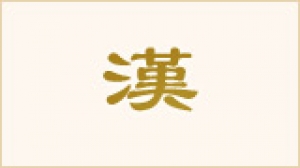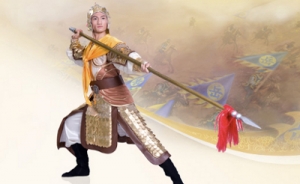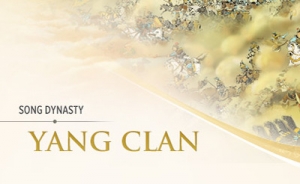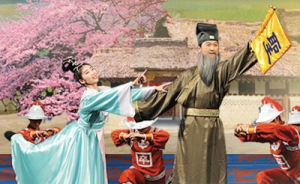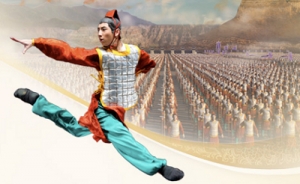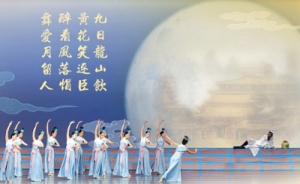The Great General Han Xin
Han Xin (approximately 231–196 B.C.) was one of Chinese history’s most outstanding military strategists. He is most famous for helping Liu Bang take power and usher in the 400-year-long reign of one of China’s most glorious dynasties. And yet, it is a story from Han Xin’s youth that is most often recounted as a lesson in tolerance.
Han Xin was orphaned at a young age, leaving him poor and with little to eat. Seeing how hungry the boy was, a woman in his hometown fed him for several weeks. This left a deep impression on Han Xin.
Not everyone in the town was so warmhearted. Although he was poor, Han Xin loved to practice martial arts and, like most Chinese people who practiced martial arts back then, he often carried a sword. One day, as he was walking down the street, Han Xin encountered another young man outside a local butcher shop.
“You might look big and tall, but how tough are you?” the bully sneered at him. Bystanders began to circle around them.
The man continued to challenge Han Xin in a booming voice: “If you’re not afraid of dying, I dare you to cut off my head. If you’re too afraid, then crawl between my legs.”
Taken aback, Han Xin stared at the young man, weighing the ultimatum. To kill him would mean that he would doubtlessly be executed in return. To crawl between his legs would mean public humiliation of the worst kind.
Han Xin mulled over the decision for some time. He then slowly knelt down and began to crawl between the man’s legs. The crowd exploded with laughter, holding their belly with one hand and pointing at the faint-hearted Han Xin with the other.
But Han Xin’s mind was focused on more important matters.
A New Dynasty is Born
By the end of the Qin Dynasty, China had fallen into chaos and several states were vying for control. Han Xin approached Xiang Yu the Conqueror, ruler of the most powerful of the warring states, offering to serve him as a general.
Xiang Yu rebuffed Han Xin’s talents, giving him only a low-level job. Refusing to give up, Han Xin turned instead to Liu Bang, ruler of the much weaker Han Kingdom, offering his assistance.
One of Liu Bang’s military advisers, Xiao He, knew of Han Xin and greatly admired him. He eagerly advised Liu Bang to recruit him, but Liu Bang repeatedly turned him down. Again, Han Xin was granted a lowly position of managing supplies. Frustrated, Han Xin decided to leave. But at the last moment, Xiao He visited him, skipping his evening roll call to convince the young man to stay. He promised to try one more time to convince Liu Bang that Han Xin was very valuable.
“Han Xin is one of our nation’s most talented men,” Xiao He told Liu Bang. “If you wish to remain merely the ruler of our Han Kingdom, go ahead, you don’t need Han Xin for that. But if you want to rule all of China, no one but Han Xin can design a plan for you to do so.”
Those were the magic words. Liu Bang finally took Xiao He’s advice and appointed Han Xin as his leading general. Han Xin then devised a brilliant, comprehensive military strategy for defeating Xiang Yu and the other states, and Liu Bang agreed to implement it.
The strategy began with a trick: Han Xin’s men would advance toward the Yong Kingdom under the guise of repairing roads but, instead, they would launch a surprise attack. The plan worked. The victory was speedy and Han Xin’s forces easily conquered the territory.
Using a variety of innovative strategies, Han Xin then captured King Bao of the Wei Kingdom, King Ge of the Zhao Kingdom, as well as the states of Yan and Qi to the north and east. With these new territories under his forces’ control, Han Xin surrounded the state of Chu, encircling Xiang Yu from all sides. Xiang Yu the Conqueror was done for—he slit his own throat on the banks of the Wu River.
With Han Xin’s help, Liu Bang’s forces emerged victorious and he became the first emperor of a new dynasty—the Han (not the same Chinese character as the Han in Han Xin).
Loyalty and Betrayal
China’s first history book, Shiji, describes Han Xin as “unparalleled in state affairs,” his “merit unsurpassed throughout the lands.” Liu Bang even bragged that his leading general could “control even one million troops and be assured of success in battle.”
In spite of being one of the empire’s biggest stars, Han Xin did not forget the people of his old hometown. And so, after being appointed King of Chu, he went back for a visit. He sought out the woman who had selflessly shared her food with him so many years before. Han Xin gave her 1,000 catties (over 200 pounds) of gold to repay her kindness.
Han Xin found the man who had made him disgracefully crawl between his legs. As soon as the man recognized Han Xin, he became terrified and begged for forgiveness. Han Xin had a heart of great forbearance. Rather than seek revenge by killing the man, Han Xin decided to give him a chance, appointing him a lieutenant in charge of security in the capital of Chu.
And Han Xin was remarkably loyal. When conquering the Qi Kingdom, some urged him to abandon Liu Bang and set up his own kingdom in the lands he had taken over. “My gratitude to the Han King runs extremely deep,” Han Xin is said to have replied.
“He let me ride in his chariot, let me wear his clothes, and gave me some of his food to eat. I’ve heard it said that if you ride in another’s chariot, you must share responsibility for the misfortunes they encounter; if you wear another’s clothes, you must resolve their worries, and if you eat another man’s food, you must be loyal to him unto death. How could I abandon morality and justice for the sake of self-interest?”
Han Xin’s loyalty stemmed from his belief in following heaven’s will and the traditional Chinese conviction that emperors were endowed with their power thanks to divine blessing.
Liu Bang once asked Han Xin: “How many troops do you think I am capable of leading?”
“One hundred thousand,” Han Xin replied.
“And what about you?” Liu Bang asked.
“The more troops, the better I handle them.”
“If you are so capable, then why are you one of my subjects?”
“Your position is mandated by Heaven,” Han Xin replied. “It is not something humans can change.”
Despite Han Xin’s assurances that he had no intention of usurping the throne, over time Liu Bang and Queen Lu became suspicious and jealous of the highly capable general. Eventually, Queen Lu framed him for “plotting a rebellion.” Han Xin was led into a trap and killed at Changle Palace along with his relatives. The remainder of his clan was later wiped out as well.
In spite of its unjust ending, Han Xin’s story has remained a source of inspiration for over 2,000 years. Re-enacting the classic, Shen Yun’s dance Han Xin brings to life the general’s loyalty, bravery, forgiveness, and faith, honoring the life of this great man and the values he etched into a chapter of Chinese history.
2. אוגוסט 2011


